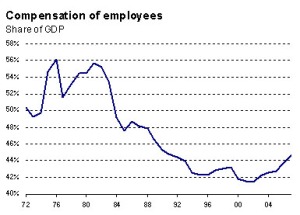Where is economics on the political spectrum?
There seems to be a lot of discussion surrounding economists position on the political spectrum. My answer to this would be that economists are not a political group or a club so economists themselves will be spread over the political spectrum.
However, I have to admit that the process used when discussing economic issues does lend itself (or suits people would already think like it) to a specific way of thinking. As a result, I’m going to discuss where I THINK my own views stand using the definitions of wikipedia. As I am not a political scientist this discussion will be quite useless – so if any political experts would like to help me out in figuring out where my views lie, please give it a go in the comments section.
Ok here we go.

